

PopEntertainment.com >
Feature
Interviews - Music >
Feature Interviews K to O >
Stacie Orrico
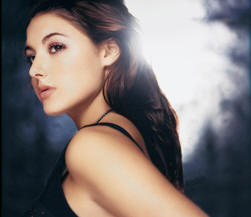 Stacie
Orrico
Stacie
Orrico
Waking Life
by
Jay S. Jacobs
Copyright ©2006 PopEntertainment.com. All rights reserved.
Posted:
November 15, 2006.
In the image-obsessed, party-hopping world of
pop music, itís kind of nice to find someone with her priorities straight.
Stacie Orrico has been recording since she was twelve, but sheís never been
part of the pop star scene Ė though she has certainly made significant
strides towards stardom.
Perhaps this sense of perspective comes from
her background. Her father did work as a missionary and as a young girl she
lived all over the world, spending time in rodent-infested,
poverty-stricken villages where things like
edible food and warm water were a rarity. By the time
she was twelve, her family had moved back to the
States and she stumbled into her career path. As
a fluke she joined a singing contest in Estes Park, Colorado. She not only
won, but caught the eye of a music exec who wanted to sign her on the spot.
In 2000, when she was only
fourteen, she released her debut CD Genuine,
a Christian Contemporary disk which became
a surprise crossover success and led to a tour with Destinyís Child. Her
second self-titled disk came out when she was seventeen and became an even
bigger smash, sending the song ď(Thereís Gotta Be)
More to LifeĒ up the pop charts. Orrico was just at the point that most
aspiring musicians dream of attaining. However it did not make her happy.
After the success of the Stacie Orrico
CD, Orrico felt her career was swallowing up her life and she quit the
business so that she could experience a normal existence.
Now, three years later,
twenty-years old and musically invigorated, Orrico has returned to the fray
with her best album yet. Beautiful
Awakening shows
her to be a musically diverse, smart and soulful. A couple of months before
the albumís official release, the first single, ďIím Not Missing You,Ē is
making its move up the chart and looks like it may become her biggest single
yet.
In New York for a pre-release artist showcase,
Orrico took the time to sit down with us and discuss her music, her dreams,
her lifestyle and the allure of just being an average girl.
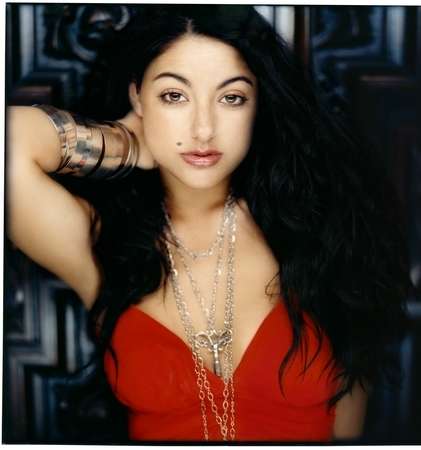 How did you originally get into music?
How did you originally get into music?
Actually,
it was kind of on a fluke. (laughs)
I really never had any desire to get signed or be a child pop star or
anything. When I was twelve I ended up going to this music
seminar [in Estes Park].
When I was a kid I lived in Colorado for a little while.
Oh you did?
Yeah, I lived in
Boulder for a year.
Oh, okay, yeah. I was in Arvada, so I was
close.
Iíve been in Estes
Park many times, itís a wonderful town.
Yeah, it is. I go to this music seminar to see some shows and ended
up entering a vocal competition on a whim, at the last minute. One of my
judges was an A&R guy from EMI and he offered me a deal. I didnít really
take him seriously and didnít take him up on it for like nine months, after
he kept calling and said, ďCome on, just come to Nashville and try it out
and see what happens.Ē Then a year later I was signed and beginning to make
records.
You were only
fourteen when you released your first album and had your first hit single at
a time when most of your friends were in junior high school. How surreal
was that?
It was really crazy, because
people ask me; do you feel like you missed out on a normal life? But
really, starting at such a young age, my whole life was so abnormal. I left
school. My last year of school was when I was fourteen. I never went to a
day of high school. I didnít go to proms. I didnít play sports in high
school or things like that. But, you know, my whole life has been very
unconventional. My family Ė we did a lot of missions work when I was
younger, so we lived out of the country. My dad had a job that allowed us
to travel to Europe a lot over the summers. So my life had always been in
and out of the normal system. I
donít know that I would sit down with every parent of a talented child and
say you should try to get them record deals when theyíre twelve.
(chuckles)
Because I think it can be a very potentially dangerous industry. At the
same time, I feel very, very fortunate to have gotten to experience so much
in twenty years. I realize that at the age of twenty Iíve gotten to
see and experience and visit more places than a lot of people get to in an
entire lifetime. I still have my whole life in front of me. I
could make records for another fifteen years and then decide to quit and
never make music again and Iíd only be 35 years old. Iíd have plenty of
time to get married and have a family and go back to school and do something
totally different. Iím very lucky.
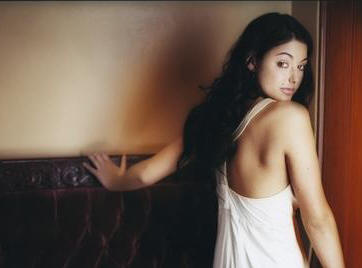 Through that album,
Destinyís Child kind of took you under their wings and let you open for them
on tour. Even though your first album did well, you were known at the time
as more of a Christian Contemporary artist than a pop artist. What was it
like to know that a huge group like that would take interest in you?
Through that album,
Destinyís Child kind of took you under their wings and let you open for them
on tour. Even though your first album did well, you were known at the time
as more of a Christian Contemporary artist than a pop artist. What was it
like to know that a huge group like that would take interest in you?
It was really amazing, even how it all came
about. Fortunately, the girls grew up listening to a lot of gospel music.
So even though I wasnít signed with Virgin yet Ė I was signed to a gospel
label Ė they somehow became familiar with my music and wanted to give me a
chance to play in front of more people. More diverse crowds than I had had
the opportunity to up until that point. I just learned a lot from them.
First of all, theyíre obviously excellent at what they do. Theyíre truly,
truly talented. They set a really high standard for me early on, on just
how to treat the people around you. They came in Ė Iíll never forget them
coming into my dressing room, opening night of the tour, they came and sat
with me and Iím just this little fourteen-year-old kid. Theyíre like,
ďStacie, we just want to let you know that we really value you as a part of
this tour. Weíre really glad that youíre here. Anything that you need, let
us know.Ē You know, who does that? Beyoncť. They were wonderful to me. I
think Iíve always tried to remember that and how much that meant to me when
Iím working with other artists, or even my band. Just letting them know how
much I appreciate them. Getting to see [Destinyís Child] perform night
after night, that was definitely very inspiring.
Even after the
success of the debut album, your self-titled second CD was even a huge jump
up from that and ď(Thereís Gotta Be) More to LifeĒ became a huge hit.
Suddenly you were all over the radio and TRL, playing bigger and
bigger showsÖ it must have been kind of overwhelming for a seventeen year
old. How did you handle it?
I think itís going to be overwhelming for
anyone at any age. Especially for me as a seventeen year old, it began to cross the line of just being overwhelming into being
kind of dangerous. For me, growing up in the music industry from the age of
twelve and spending some of the most vital developmental years of my life in
the music industry Ė I began to just find my whole identity and the entire
foundation of my life and my relationships and what I perceived to be
normal. It was all rooted in entertainment. In the music industry. I
didnít have a healthy foundation of normal life underneath that, to
be able to gauge things. It really threw me off. I woke up
one day and was like, oh my gosh, I donít know who I am or what my identity
is, where my value lies, outside of my job. I donít think thatís healthy. I
donít think thatís right. It kind of wigged me out for a while. That was
when I decided I needed to take some time away and kind of shut down the
whole machine, even if it meant getting dropped from Virgin. I knew that I
needed to go and discover who I was and find my identity outside of Stacie Orrico, the artist. Thatís what I was doing for those couple of years.
Itís the best thing I ever did, not only for myself personally, but for my
relationships and my family and even for my career. Because, I just see
things with such a different perspective now. Thereís so much more freedom
in the way I approach my career, because Iím not clinging to it for my
validation as a person, you know? If I put out this new record and it
flops, yeah that will suck and Iíll be disappointed. Itíll be sad, but I
wonít feel ruined as a person. Itís what I do. Itís what I love. Itís not
who I am.
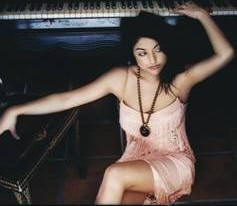 I thought it was
really fascinating that after your success with your last album, you decided
to take that break and chuck it all and move to Seattle with your parents
and took a job at a fish and chips place for minimum wage. What was it like
to finally be able to be just another teenaged girl and was it at all a
culture shock to go from having hit singles to just being in a normal
working environment?
I thought it was
really fascinating that after your success with your last album, you decided
to take that break and chuck it all and move to Seattle with your parents
and took a job at a fish and chips place for minimum wage. What was it like
to finally be able to be just another teenaged girl and was it at all a
culture shock to go from having hit singles to just being in a normal
working environment?
Honestly, it was
so much more
comfortable for me there than it is in the music industry. Itís funny,
in my free time, I donít go out and party. Iím not
hanging out with P. Diddy and Paris Hilton at the clubs of New York. Iím in
New York right now, Iíve got a free night, Iím not going down to the
meat-packing district to go out drinking and dancing. Itís not like Iím
saying I have a problem with people doing that. Itís just not me. Iím kind
of a homebody. I love being with my family. I would prefer to go home and
go to the grocery store and cook with the family and sit around and pull out
the guitars and sing songs around the fireplace. That is much more natural
for me. The whole celebrity thing or being stopped on the street and having
people want me to sign stuff and things like that Ė that has always felt
really unnatural to me. Even after being in the industry for eight years Ė
not that Iím like Madonna or anything Ė if people stop me it still feels
unnatural to me. I still donít fully feel even completely comfortable with
it. So, getting to work at a job where I had to wear an ugly outfit and
just got to interact with people over normal life things. Got to live a
much more normal life. It reminded me, wow, this really is who I am.
(laughs) This really is what I love
and I think thatís why itís been so important to me to balance out my
schedule a lot more so that I do get time to live my normal life. Iím just
a normal girl. (laughs again)
When did you decide
after taking the break that you were ready to get back into writing and
recording?
You know, it was a really
natural progression. Slowly, as I began to kind of be able to let go ofÖ I
donít know, just the clinging that I had had onto the music industry and
onto my career and success and all of that Ė I was able to kind of let that
go and just be able to re-embrace music as something that should just be
enjoyable and just a free expression of my life and my experiences. I
started to become inspired again and it didnít seem so scary. It
just felt more like Iím going to make music because I love it. Not because
I have to. Not because anybody is breathing down my neck. Not because
thereís some high standard that I feel like I need to be reaching. Itís
just because I love music. I didnít even tell the label that Iíd gone back
into the studio, because I knew I was ready to write but I didnít know if I
was necessarily ready to go back on the road or turn in my album to the
label. So, I just got in the studio and started writing. 55 songs later I
had an album. I was like, okay, actually I think Iím ready to turn this
in. I called them up and theyíre like, ďSo, are you kind of ready to get
working again?Ē I was like, actually, my recordís done if you want it.
(laughs)
Theyíre like, ďAre you serious?Ē Then we just started getting the ball
rolling again. But, again, I feel like Iím starting my career from
scratch.
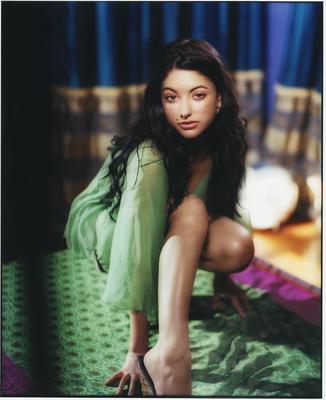 Beautiful Awakening
seems a lot more laid back than most contemporary soul albums Ė not all
the busy production and the over-singing that you hear so often. Were you
trying to make a more reflective, quiet album?
Beautiful Awakening
seems a lot more laid back than most contemporary soul albums Ė not all
the busy production and the over-singing that you hear so often. Were you
trying to make a more reflective, quiet album?
You know what, I
really wasnít. I think thatÖ you know, I donít want to be one of those
artist thatís always bashing my last project. Like, oh, the label made me
do this and thisÖ Because the truth is every album Iíve put out has been
kind of a reflection of that season of life and that time. I was fifteen
years old when I made the last album. I think that if I would have had full
creative control, in the past, I think all of my albums so far would have
been much more organic in the production. Much more simple. I mean, every
record that Iíve ever been deeply, deeply inspired by growing up has either
been black gospel music, soul music, jazz music, blues music, R&B. Thatís
all Iíve ever been inspired by. The fact that any of my previous records
would reflect any type of pop-rock or anything is almost laughable, because
I didnít grow up being inspired by anything remotely close to that. It
wasnít like I went into this album saying, okay,
now that Iím older I want to be more sophisticated and I want to make a
record like this. I just finally had the freedom to kind of
do what I do. What
naturally came out was definitely a more organic body of work.
It was really
interesting way you played with styles on the album. Where everything was
definitely soulful and much of it had a backbeat, there were subtle little
touches in the songs. The title track is an acoustic ballad, ďDream YouĒ
had little hints of world beat, ďTake Me AwayĒ mixes smooth jazz and hip
hop, ďDonít Ask Me To StayĒ had a bit of a disco backbeat, ďWaitĒ was really
quiet storm and ďEasy To Luv YouĒ had something of an old-school doo wop
feel. Were you looking to experiment with styles on the album?
Yeah, I really was. I ended
up feeling like I went to music school or something for a year and a half
while working on that album. I got to work with such a diverse group of
people. Everybody fromÖ you have the big names like Dallas Austin and Sheíkspere and stuff who have on there the R&B and hip-hop stuff. But then,
like Track & Field do a reallyÖ are very much into world music. We
experimented withÖ like we had Brazilian drummers come in and I had some of
the drummers from the original cast of StompÖ
you know the musical Stomp?
I had some of those drummers come in. They built drum sets out of cans and
littleÖ big trash cans and all this stuff. They just kind of took all this
stuff that was laying around the studio and built makeshift drumkits and
they played drum tracks. We just got to really experiment and play. And
then going on and working with Salaam Remi, who did all the early Fugees
stuff, The Score and
Miseducation of Lauryn Hill.
Getting to experiment with
all these different people really taught me so much. Made me have the
opportunity to discover what types of music I do and donít identify with.
There were some sessions where I went in and where I worked with people and
it was like, ďOkay, letís do a full-out rock session!Ē It was like, okay, I
just wasnít feeling it. Or, ďLetís try to do something really hip-hop, just
for the heck of it. Letís seeÖĒ Itís like, okay, thatís not working. You
settled on the stuff that really felt right.
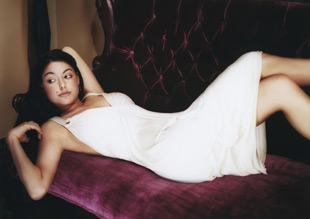 I really love the
first single, ďIím Not Missing You.Ē When you were writing songs with
people and recording, did that feel always like
the single to you? Did you decide which one would be the single, or was it
the label?
I really love the
first single, ďIím Not Missing You.Ē When you were writing songs with
people and recording, did that feel always like
the single to you? Did you decide which one would be the single, or was it
the label?
You know, Iím going to be totally honest.
In the past, I probably would have made up a great story about why I wanted
that song to be the first single. Truth is, there are definitely a lot of
other songs on the album that I like better.
(laughs)
I think that ďIím Not Missing YouĒ is by far the most straight up pop song
on the album. I totally understand why the label felt like that was a good
bridge between where we left off with ďMore to LifeĒ and where weíre going
with this new album. The truth is, every song on the record I am proud of
and Iím happy with and I wrote. So itís definitely not something that Iím
ashamed of or not proud of, because the song is great. But I am excited,
because I think that ďIím Not Missing YouĒ kind of cracks the door open to
what this new album is. Hopefully, once people buy it, theyíll be
pleasantly surprised to see that thereís a lot more depth on the album than
ďIím Not Missing YouĒ embodies.
Early on in your
career, you were a Christian Contemporary artist, but
Beautiful Awakening seems to be
mostly rather secular. Why did you make the change and do you feel your
spirituality comes out in the music anyway?
Obviously
everybody can interpret music in different ways and there can be songs that
make zero reference to anything spiritual and it can connect with somebody
in a really spiritual way. There are songs that somebody can write directly
to God and somebody can have it sung at their wedding, because it speaks to
them in a relational way. You know what I mean? Itís like I canít fully
control the way that people receive the music. Itís interesting, because I
did end up writing a lot of relationship songs on this album. It wasnít at
all because I went into it like, okay, now I wanna make a record that moves
away from anything spiritual. That wasnít it at all. It just happened to
be that I was really experiencing the ups and downs of falling in and out of
love during that year. The album, even though itís not all in order, in
sequence, the album kind of tells the story of meeting this guy and falling
in love. And enjoying it and then starting to ask questions. Questioning
him and questioning myself and then breaking up and the pain of the break
up. Actually the last song I wrote of that series was ďIím Not Missing
You,Ē which was when I finally felt free. So, as far as my faith and how
that plays into my career and my music and my life Ė to me this feels like
the most spiritual body of work Iíve ever made, just because I know what was
going on in my mind and heart while I was creating it. I feel like my
relationship with God is much more real to me and much more alive and much
more something in a personal way now than it even was when I only signed to
a gospel label. I donít know that people can always fully understand that
how many times you say Jesus in a song doesnít necessarily depict what your
relationship with God is actually like.
(laughs)
So, to sum it all up, if anybody wonders if Iím hitting a point where Iím
like, okay, Iím older now and I donít really care about the spiritual stuff
anymore, or I donít want to be defined by that anymore, thatís not it at
all. Iím totally open and fine and happy to talk about the fact that I am a
Christian. Thatís who I am. Iím a Christian and I sing songs about every
aspect of my life, including my spiritual life, my relational life and all
of that.
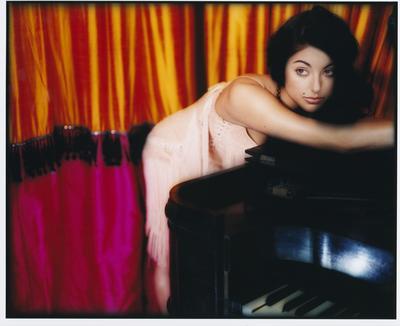 Say you were looking back at your career from many years in
the future. How would you like people to see your body of work?
Say you were looking back at your career from many years in
the future. How would you like people to see your body of work?
Itís interesting, because I actually just got a call this
week sayingÖ there were some people from the label who were
saying, ďWe feel like we need more cabaret drama or a scandal or something
around Stacie, because we need to get people talking. So, we need to get
some dirt, you know? Even if we have to just make something up. We need to
have a scandal.Ē Itís really sad to me how weíre living in this timeÖ I
feel like itís especially in the last five years, itís all about just being
famous and being a celebrity. There are people who are on the cover of
every single magazine who are super famous kazillionaires, but you donít
even know what theyíre famous for. Theyíre just famous for being famous. I
feel like as musicians and artists, because thereís been that celebrity
craze, weíre kind of swept into that same category. In order to do well,
yeah you have to have a good song and good production, a pretty good live
showÖ but also you have to have a famous boyfriend and a clothing line and a
reality TV show. Iím just not interested in any of that. Iíve never dated
anybody in the music industry. I donít go out and party. I donít want to
have a clothing line. All those things just donít interest me. I would
love for people to look back and say, ďStacie Orrico was able to be a true
artist and she always kept it just about the music. It wasnít about having
a mascara endorsement. It wasnít about dating some hip hop producer. It
wasnít about her line of boots. She genuinely made good music. She put on
an amazing performance. Her records were always solid. She stayed true to
that. We didnít see her going in and out, shopping at Barneyís every day.
We didnít see her all over the tabloids. But, she still did well, because
the music spoke for itself.Ē I donít want to add a bunch to that. I hope
that people will remember me just for that. If in twenty years people canít
ever remember who I dated and who I was married to, or what the names of my
dogs were and stuff, I will be totally fine with that.
(laughs)
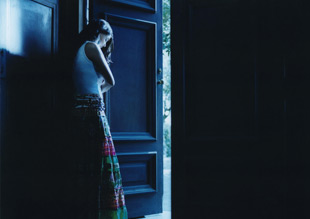 Are there any misconceptions you'd like to clear up?
Are there any misconceptions you'd like to clear up?
Oh, thatís a good question. You
had me thinking a lot with what I was telling you about the whole scandal
thing. Itís sad to me that I feel like even the label; their fear might be
that Iím too boring of a person because I donít have a bunch of drama around
me. I think that Iíve lived one of the most interesting, fascinating lives
that people could ever imagine. Iíve lived in other countries where I had
to take freezing cold showers and all I could eat was peanut butter for three
years of my life because the food was so disgusting. I would have rats
crawling up out of my sheets in the middle of the night. Then Iíve been at
crazy, huge award shows getting to perform with artists from all around the
world. My life has been very full and very exciting. I hope that people
donít ever look at my life and my career and go, ďOh, because she doesnít
have all the drama going on sheís a boring person.Ē I hope that people will
realize that doesnít make your life interesting. That doesnít make your
life fun. It doesnít make you more exciting of a person to have a bunch of
scandalous drama going on all the time. Itís really about getting up every
day and maximizing each day and living well and loving the people around you
and making wise decisions and working hard and setting goals and
pouring
yourself into achieving those things. I would love for people to not see my
lack of scandal as being boring.
Features
Return to the features page

